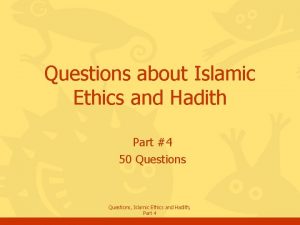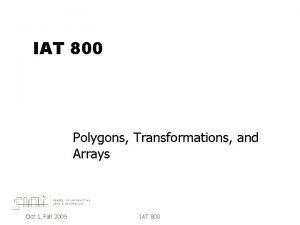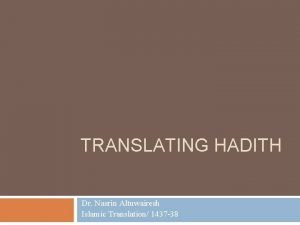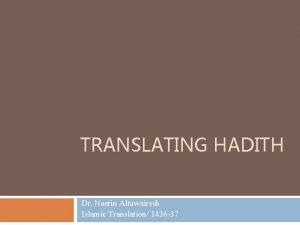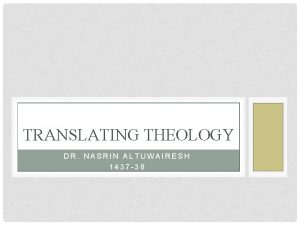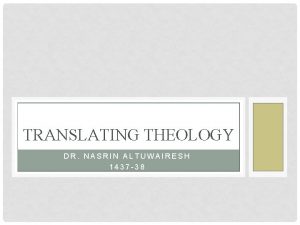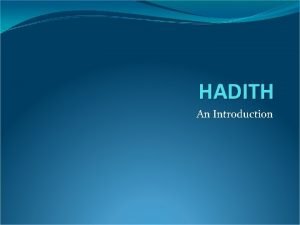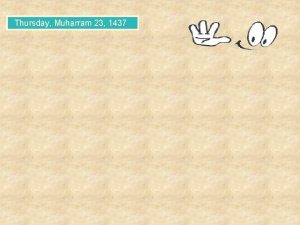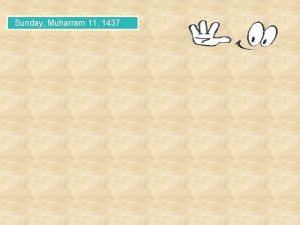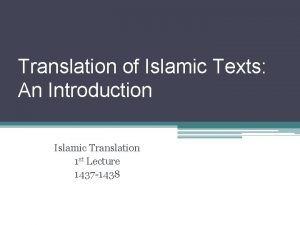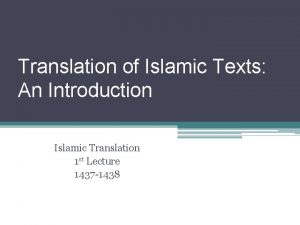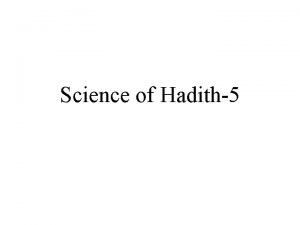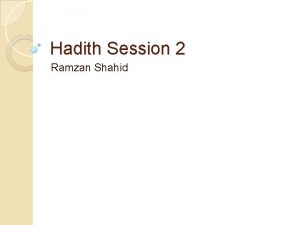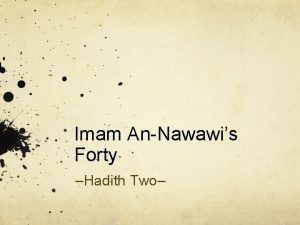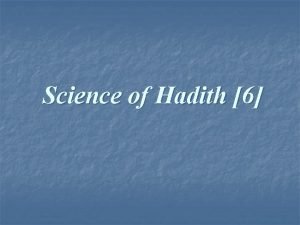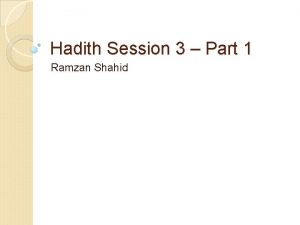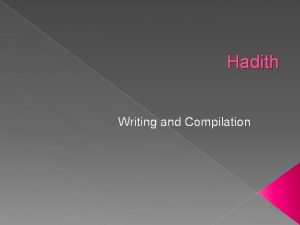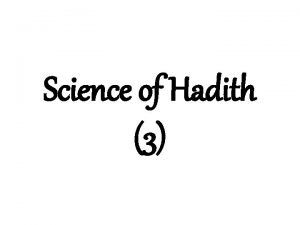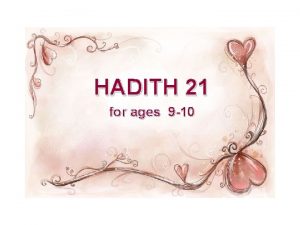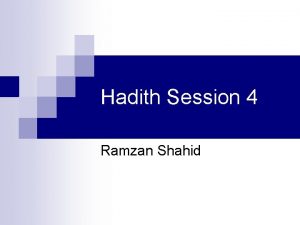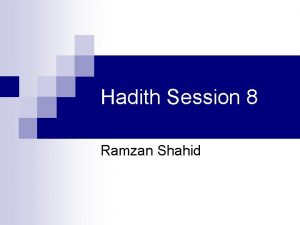TRANSLATING HADITH Dr Nasrin Altuwairesh Islamic Translation 1437





















- Slides: 21

TRANSLATING HADITH Dr. Nasrin Altuwairesh Islamic Translation/ 1437 -38

Hadith: Definition Hadith is defined as “the report of the words ( )ﺃﻘﻮﺍﻝ , actions ( )ﺃﻔﻌﺎﻝ , or approval/ disapproval ( )ﺗﻘﺮﻳﺮ of the Prophet (peace be upon him)”

Components of Hadith: Isnad (leaning): a chain of narrators or transmitters reporting the hadith The formula introducing such a Hadith would speak in the first person: “It was related to me by A, on the authority of B, on the authority of C, on the authority of D, from E (here a companion of Muhammad) that the Prophet said…. ” This chain of names constituted the isnād on which the saying or event depended for its authenticity. Matn (gist): the text/ narrative itself Takhreej

Classification of Hadith: § § § sahih (“sound, authentic") hasan ("good") da'if ("weak") Forged/ Fabricated Hadith ( )ﻣﻮﺿﻮﻉ Hadith Qudsi (Divine/Sacred/ Holy Hadith)

Hadith Qudsi What is the difference between Hadith Qudsi and Quran?


Translation of Isnad: On the authority of OR Narrated Abi Hurarah (may Allah be pleased with him) who said: the Messenger of Allah (peace and blessings of Allah be upon him) said: ….

Translating takhreej : Narrated/ related/reported by Al. Bukhari ( )ﺭﻭﺍﻩ ﺍﻟﺒﺨﺎﺭﻱ [Bukhari, Muslim, etc. ] Agreed upon ( )ﻣﺘﻔﻖ ﻋﻠﻴﻪ : ﻭﻓﻲ ﺭﻭﺍﻳﺔ ﺃﺨﺮﻯ § In another narration, § Another narration reads/ states,

1. Prophet’s Actions ﻭ "ﻻ ﻭ ﺍ ، ﻭ ﺍ ﺍﻟ ﺻﻠﻰ ﺍﻟﻠﻪ ﻋﻠﻴﻪ ﻭﺳﻠﻢ ﻱ ﻯ ـ ـ ﺍ ﺍ ، ﻋﻦ ﺍﻳ ( )ﺭﻭﺍﻩ ﺍﻟﺒﺨﺎﺭﻱ. ﻭﺍ Narrated Al-Mughira bin Shu`ba who said: The Prophet used to pray so much that his feet used to become edematous or swollen, and when he was asked as to why he prays so much, he would say, "Shall I not be a thankful slave (to Allah)? “. [Related by Albukhari]

1. Prophet’s Actions ﺍﻟ ـ ﺭﺿﻰ ﺍﻟﻠﻪ ﻋﻨﻬﻤﺎ ـ ﺍ ﺍ ﻭ ﺍﻟ ﺻﻠﻰ ﺍﻟﻠﻪ ﻋﻠﻴﻪ ﻭﺳﻠﻢ ﺍ ( ﺍﻷﺍ ﺍ)ﻣﺘﻔﻖ ﻋﻠﻴﻪ Narrated Ibn `Umar (May Allah be pleased with them), who said: The Messenger of Allah (peace and blessings of Allah be upon him) used to perform I`tikaf (seclusion for prayers) in the last ten days of Ramadan. [Agreed upon]


2. Prophet’s Approval/Disapproval On the authority of Abu Abdullah Jabir bin Abdullah al. Ansaree (may Allah be pleased with them) who said: A man asked the Messenger of Allah (peace and blessings of Allah be upon him) and said, “Do you think that if I perform the obligatory prayers, fast in Ramadan, treat as lawful that which is lawful, and treat as forbidden that which is forbidden, and do not increase upon that [in voluntary good deeds], then I shall enter Paradise? ” He (peace and blessings of Allah be upon him) replied, “Yes. ” [Muslim]


Prophet’s Words: On the authority of Abi Abdulrahman Abdullah ibn Omar (may Allah be pleased with them), who said: I heard the Messenger of Allah (peace and blessings of Allah be upon him) say, "Islam has been built on five [pillars]: testifying that there is no deity worthy of worship except Allah and that Muhammad is the Messenger of Allah, establishing the salah (prayer), paying the zakat (obligatory charity), making the hajj (pilgrimage) to the House, and fasting in Ramadhan. " [Bukhari & Muslim]

3. Prophet’s Words: ﻱ ـ ﺭﺿﻰ ﺍﻟﻠﻪ ﻋﻨﻪ ـ ﺍﻟ ﺻﻠﻰ ﺍﻟﻠﻪ ﻋﻠﻴﻪ ﻭﺳﻠﻢ ﺍ " ﺍ ﻷ ﺍﺍ ( )ﺭﻭﺍﻩ ﺍﻟﺒﺨﺎﺭﻱ. ﺍ ﺍ ﺍﻟ ﻳ ﺍ ، ﺍ ﺍﺍ ﻳﺍ Narrated Abi Hurraira (may Allah be pleased with him), who said: the Prophet (may peace and blessings of Allah be upon him) said: “A woman is married for four reasons: for her wealth, her family chain, her beauty and her religion, so marry a woman for her religion and you will be blessed. ” [Reported by Albukhari]


Prophet’s Words: On the authority of Abdullah ibn Umar (may Allah be pleased with him), who said: The Messenger of Allah (peace and blessings of Allah be upon him) took me by the shoulder and said, “Be in this world as though you were a stranger or a wayfarer. ” And Ibn Umar (may Allah be pleased with him) used to say, “In the evening do not expect [to live until] the morning, and in the morning do not expect [to live until] the evening. Take [advantage of] your health before times of sickness, and [take advantage of] your life before your death. ” [Al-Bukhari]


Prophet’s Words: On the authority of the Leader of the believers, Abu Hafs 'Umar bin al-Khattab (may Allah be pleased with him) who said: I heard the Messenger of Allah (peace and blessings of Allah be upon him) say: "Actions are (judged) by motives (niyyah), so each man will have what he intended. Thus, he whose migration (hijrah) was to Allah and His Messenger, his migration is to Allah and His Messenger; but he whose migration was for some worldly thing he might gain, or for a wife he might marry, his migration is to that for which he migrated. " [Related by the two Imams of the scholars of Hadith, Abu Abdullah Muhammad bin Ismael Albukhari and Abu Alhussain Muslim bin Alhajaj Alnisaboori , in their two Sahihs which are the most


Hadith Qudsi On the authority of Abi Dharr (may Allah be pleased with him) from the Prophet (peace and blessings of Allah be upon him) is that among what he relates from his Lord is that He said: (O My servants! I have forbidden oppression for Myself and have made it forbidden amongst you, so do not oppress one another) [Related by Muslim].
 Islamic ethics
Islamic ethics Splitware
Splitware Nasrin ghanbari
Nasrin ghanbari An approach to english translation of islamic texts
An approach to english translation of islamic texts Merits of grammar translation method
Merits of grammar translation method Semantic translation method
Semantic translation method Voice translation-rule
Voice translation-rule Function transformations
Function transformations Noun phrases
Noun phrases Translating linear inequalities
Translating linear inequalities Spherical faced follower
Spherical faced follower Translating phrases
Translating phrases What are verbal expressions in math
What are verbal expressions in math Translating ore polygons
Translating ore polygons Transformation of quadratic functions
Transformation of quadratic functions Translation of financial statements
Translation of financial statements Compound word blackboard
Compound word blackboard Relative motion of two particles using translating axes
Relative motion of two particles using translating axes Translate expressions and equations
Translate expressions and equations Using transformations to graph quadratic functions
Using transformations to graph quadratic functions Using transformations to graph quadratic functions
Using transformations to graph quadratic functions Transformation graphs worksheet
Transformation graphs worksheet
